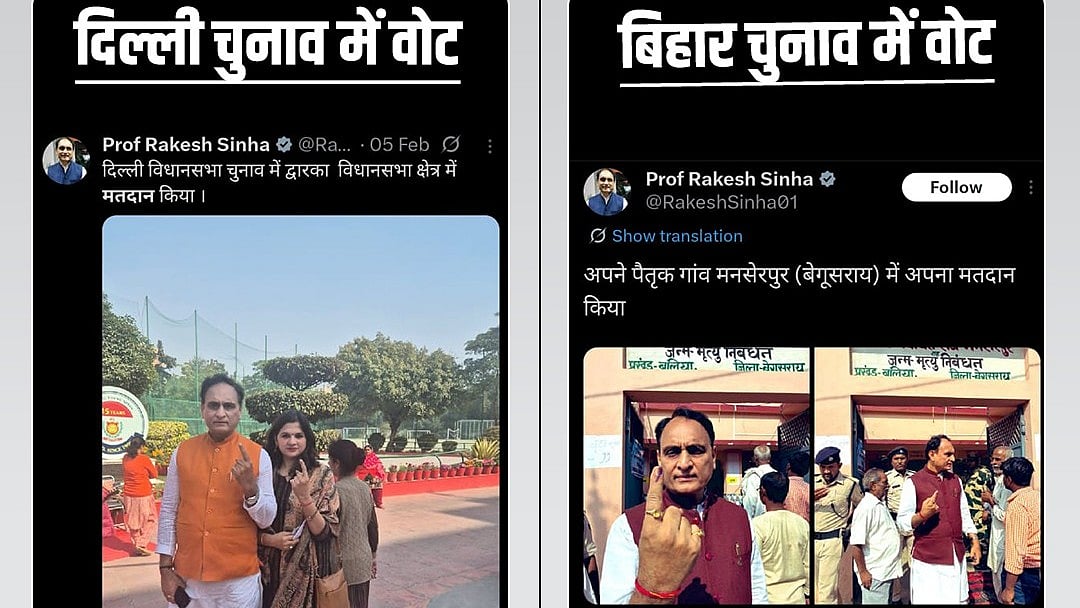POLITICS
Same face, two votes? Opposition accuses BJP leaders of voting in two states
Political storm breaks out as Opposition accuses Sinha, two others of voting in Delhi and Bihar in one year, terms it proof of 'vote chori'

A political storm broke out on Thursday after Opposition parties accused Rakesh Sinha, BJP leader, Rajya Sabha member and Delhi University academic, of voting in both Delhi and Bihar within the same year, terming it proof of “vote chori” (theft). Two other BJP leaders were also hit with the same accusation.
The charge — led by the Congress, Aam Aadmi Party (AAP) and Rashtriya Janata Dal (RJD) — quickly spiralled into a wider controversy over alleged irregularities in the ongoing Bihar polls and the credibility of the Election Commission’s Special Intensive Revision (SIR) of voter rolls.
Screenshots circulated on social media by the Congress, AAP’s Saurabh Bharadwaj and RJD leaders purportedly showed Sinha’s name on Delhi’s electoral roll, alongside a post suggesting he had also cast his vote in Begusarai, Bihar, during the first phase of polling. The Opposition argued that this was “direct evidence of BJP’s manipulation”, accusing the Election Commission of turning a blind eye while removing names of non-BJP voters elsewhere.
Published: undefined
"Today’s incidents have proved that the SIR exercise is nothing but a sham. Former BJP MP Rakesh Sinha, who cast his vote in the Delhi elections in February, was seen voting again today in the Bihar polls. Similar examples are emerging of BJP leaders and workers who have voted in both Delhi and Bihar, in clear violation of election laws.
"And yet, the Election Commission is busy using the SIR as an excuse to delete the names of voters who don’t support the BJP," Congress media and publicity department chief Pawan Khera said at a press conference.
Published: undefined
Sinha, however, rejected the allegations as baseless and politically motivated. In a statement on X, he said his voter registration had been legally transferred from Delhi to his ancestral village in Begusarai ahead of the Bihar polls. He insisted he was no longer registered in Delhi and threatened legal action against what he described as a malicious campaign by Opposition parties.
Other BJP functionaries, including Delhi Purvanchal Morcha chief Santosh Ojha and local organiser Nagendra Kumar, were also accused of similar dual voting practices, though no independent verification of these claims has yet emerged.
Under Indian electoral law, a citizen may only be registered in one constituency at a time, corresponding to their “ordinary place of residence”. If a person moves, they must have their name deleted from the previous roll before registering in a new one. Voting in two states within the same electoral cycle would therefore violate the spirit of election law, unless one registration had been officially cancelled.
In practice, however, irregularities in the electoral roll system — especially when voters shift residence across states — can allow for overlapping registrations. Election authorities periodically conduct revisions like the SIR to correct such errors, but these drives have themselves become controversial in Bihar, where Opposition parties allege that names of anti-BJP voters are being selectively deleted while others remain duplicated.
Rakesh Sinha is widely known as a professor at Delhi University’s Motilal Nehru College and a prominent RSS ideologue. Although he continues to be identified by his academic title, public records primarily describe him now as a Rajya Sabha MP nominated in 2018, and it is unclear whether he remains an active teaching faculty member.
Published: undefined
Given this dual identity — as a Delhi-based academic and a Bihar political figure — questions have naturally arisen about his residency status and the legitimacy of his voter transfer. Sinha maintains that his ordinary residence is now in Bihar, which would make his Delhi registration invalid — though critics argue that the timeline of his transfer remains opaque.
Opposition leaders have demanded an immediate probe by the Election Commission, calling the episode “proof of institutional bias” and linking it to the alleged discrepancies in the SIR voter revision drive. “Even BJP leaders are voting twice, while lakhs of Opposition voters find their names missing,” an RJD spokesperson said.
The BJP, for its part, dismissed the outrage as “Opposition frustration” and “an attempt to deflect attention from their impending defeat”. Party leaders said all BJP candidates and workers had complied with election law, and that the claims of “vote theft” were fabricated to discredit the ongoing Bihar election process.
Published: undefined
The controversy has added fuel to Opposition allegations that the BJP-led NDA has manipulated the electoral process in Bihar to offset growing anti-incumbency. It also underscores the administrative loopholes that persist even after two decades of so-called sushasan (good governance).
As one senior political observer put it, “If a sitting MP and Delhi academic can be accused of voting in two states in the same year, it shows not only the fragility of the system but also the brazenness of politics in Bihar’s 2025 polls.”
For now, Rakesh Sinha insists he is being targeted for his ideology — but the episode has opened a debate that cuts deeper than party lines: how secure and credible is the Indian voter roll in an era when ‘vote chori’ has become a political weapon in itself?
Published: undefined
Follow us on: Facebook, Twitter, Google News, Instagram
Join our official telegram channel (@nationalherald) and stay updated with the latest headlines
Published: undefined